Telugu Movie Review: Devil is a watchable, but entirely unoriginal British-Indian spy thriller

Devil is such a transparent hybridization of James Bond and RRR that I’d be stunned if there wasn’t a point (or more likely, many points) in the project’s development where it was pitched exactly as such. If screenwriter Srikanth Vissa was even remotely trying to hide these “influences” in the script, his efforts were entirely destroyed by producer/director Abhishek Nama, who seems to seize every opportunity he can to remind the viewer of them. (Nama reportedly took over directing duties from Naveen Medaram after 105 days of shooting over “creative differences,” and one must wonder if this was part of the issue.) The nonstop nods begin with the opening titles, which are such a shameless, poor man’s rip-off of a Bond introduction, it verges on adorable. I practically expected to hear a Telugu language version of Adele’s “Skyfall.” That’s the thing about Devil: for as completely lacking in originality as the film is, it’s endearing in the same way that many ’90s straight-to-video imposters once were.
Like James Bond, our hero – codename Devil – is a secret agent working for the British government. He’s Indian by nationality, but this is 1945, and Devil has sworn to protect the British Raj. We don’t know too much more about him or his background, beyond the fact that he is clearly capable of singlehandedly taking down other men by the dozen, as we watch him go about comfortably in an early action set-piece aboard a ship being raided by pirates. Lead actor Nandamuri Kalyan Ram’s performance seems to thrive upon the expository deficit when it comes to Devil’s character; he’s content to play him as rather generically suave and smooth when he isn’t showing off an investigative attention-to-detail that rivals those of Poirot and Benoit Blanc.
Hindi Movie Review: Kho Gaye Hum Kahan taps into the zeitgeist, but doesn’t offer much fresh perspective of its own
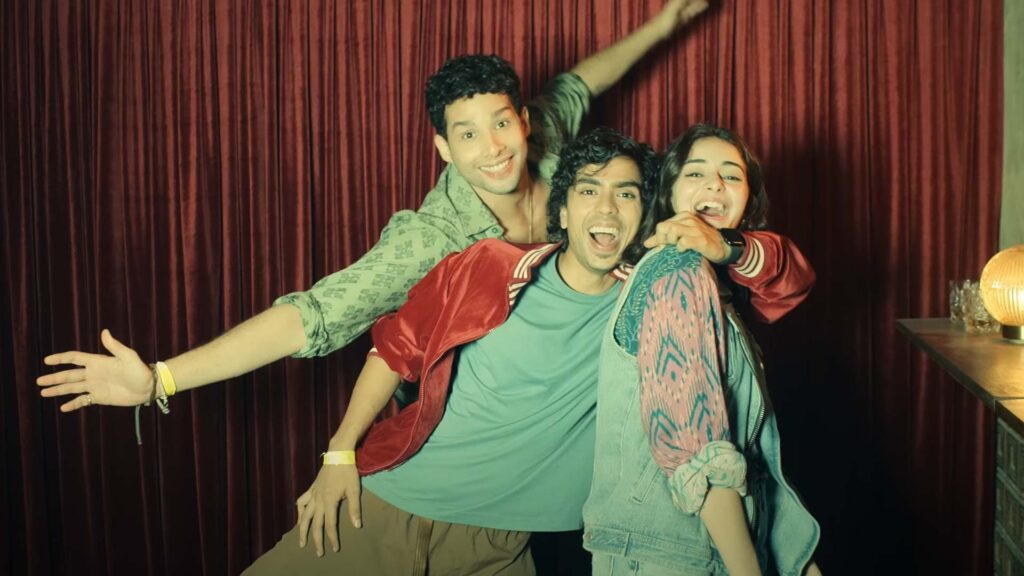
Desperate to convince you of its youthful energy but ultimately rather old-fashioned in its presentation, Arjun Varain Singh’s Kho Gaye Hum Kahan correctly identifies a lot of the sources of social unease in contemporary life without having anything vital to say about them. This is yet another “social media movie” that seeks to reflect how disconnected we all ironically are in this age of instant, accessible communication. It’s definitely a relatable topic that will broadly resonate, but do we really need another piece of media that simply reinforces the logical conclusion that the only way to escape the matrix is to put your phone down and look around?
This is an Indian film set in Mumbai, but there are very few story particulars that couldn’t be transposed onto any digitally connected nation in 2023, which is likely part of what made it an ideal candidate for worldwide distribution on Netflix. The other part, as with most OTT releases these days, is that it could just as easily pass for a miniseries as a film; it is written and directed with the slick indistinctiveness that has become the hallmark of today’s streaming “content.”
The story focuses on a group of three twentysomething friends contending with the societal pressures stemming from social media and digital identity. Imaad (played by Siddhant Chaturvedi) is an aspiring standup comedian who spends his off-nights serial-dating under a fake identity on Tinder, hooking up with dozens of women but never committing to a relationship. Imaad’s roommate, Ahana (played by Ananya Panday), has her own romantic troubles, desperate to make her “on a break” boyfriend Rohan (played by Rohan Gurbaxani) want her back by presenting a fictitious, thriving version of herself on an Instagram-like app. Meanwhile, Imaad’s longtime best friend, Neil (played by Adarsh Gourav), languishes over his “secret” tryst with a social influencer (Anya Singh), which she clearly has no intention of turning into a real, public-facing relationship.
Hindi Movie Review: Dunki succeeds as a broad character comedy, but fails as a nuanced commentary on immigration
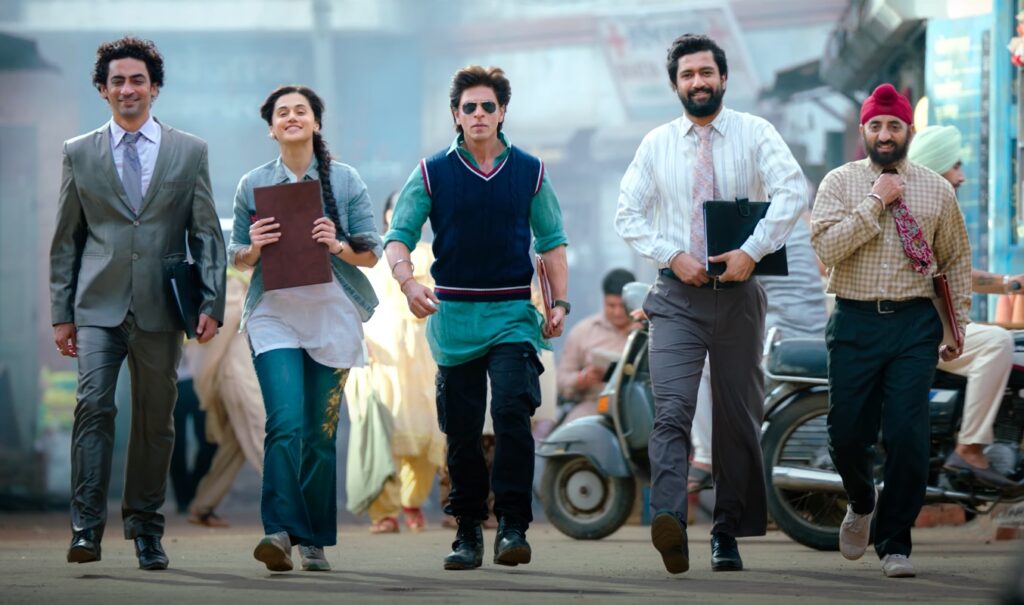
What a 2023 it has been for Shah Rukh Khan, whose return to leading roles following a four-year hiatus couldn’t have gone any better from a commercial perspective. Audiences warmly embraced his action extravaganzas Jawan and Pathaan, catapulting them to the first and second slots, respectively, for the calendar year at the Indian box office. Both garnered high marks from critics (including yours truly), as well, with robust compliments given to Khan’s performances and the overall craftsmanship of the films.
Now comes Dunki, Khan’s third and final movie of the year, and the first comedy-drama of the bunch. It’s a heartwarming, crowd-pleasing journey that’s likely to be just as much of a hit with audiences as Jawan and Pathaan, especially families looking for a feel-good outing over the Christmas holiday period. Critics, however, are likely to meet this one with more reserved praise, as its social commentary on immigration comes across as awfully simpleminded when held up to any level of scrutiny.
But let’s start with the positives, of which there are many. First and foremost, Dunki is a friendship movie/road comedy with a cast that has effortless chemistry together. After a brief prologue set in the present, we meet friends Hardy (Khan), Manu (Taapsee Pannu), Buggu (Vikram Kochhar), and Balli (Anil Grover) in the year 1995. All of the actors play both much-younger versions of themselves in 1995 and much-older versions of themselves in 2023, with relatively modest makeup and hairstyling enhancements, which is a ludicrous creative choice on its face but it somehow only adds to the film’s spunky charm.
Telugu Movie Review: Salaar: Part 1 – Ceasefire may only be half a story, but it still feels like the most massive epic of the year
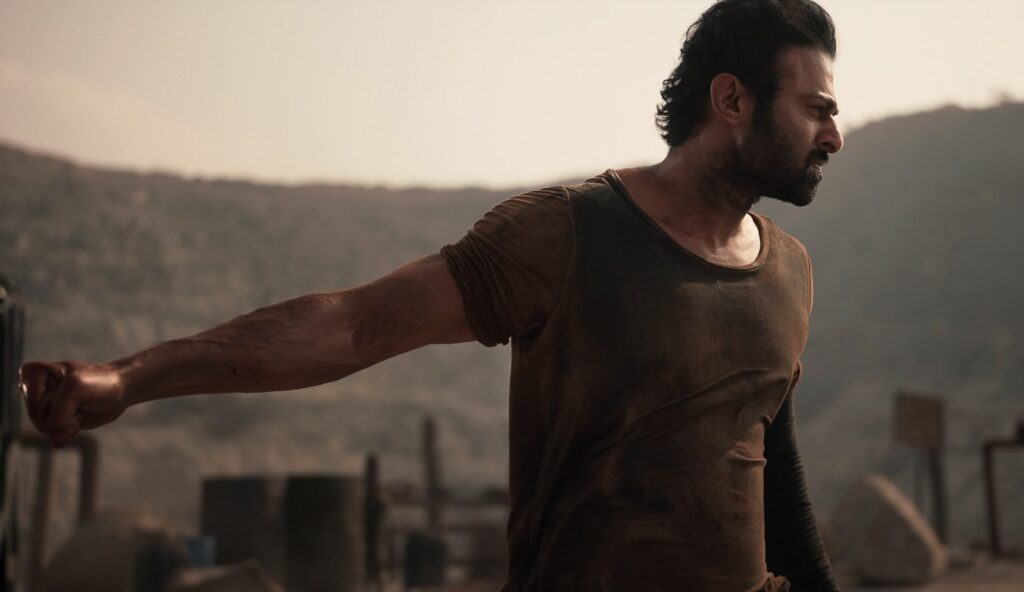
It’s been a long time since I’ve felt as utterly exhausted by a film as I was by Salaar: Part 1 – Ceasefire, which crams what seems like multiple Greek tragedies worth of material into just under three hours. And yet, despite the sheer volume of characters and story involved in the movie, it’s still basically all just exposition laying the groundwork for Part 2, which is currently in production and aiming for a release next year. Not only that, but even after this amount of setup, there remain a great number of mysteries left to be unraveled in Part 2, including how a few key characters in Part 1 connect to the main story being told in the first place. The utter enormity of what is being attempted in this saga is daunting, though at this point, one would expect no less from writer/director Prashant Neel, the mastermind behind the K.G.F. films.
For as much of an endurance test as this mythology-heavy movie is, I don’t want to imply that it is in any way joyless or a slog. Neel and the cast do a very good job of getting the viewer invested right from the outset, so that there is no temptation to give up on the mysteries of the story before the answers are finally revealed. From the very first sequence, where we meet main characters Deva and Vardha as children in a rousing moment of public uproar that will have ramifications for the rest of their lives, I “bought in” due to the sheer intensity of emotion evoked. That intensity is largely maintained after we fast-forward a couple decades and meet Aadhya (Shruti Hassan), whose life ties into Deva and Vardha’s saga in enigmatic ways that land her in mortal danger upon returning to her family’s homeland of India.
Aadhya’s story intersects with that of an adult Deva (“Rebel Star” Prabhas), who has already been established as the hero of this saga as a child, with the royal-blooded Vardha dubbing him “Salaar” (a name that means “leader, chief, or commander”). Living as an outcast in a remote area of India with his mother (Easwari Rao), it’s immediately apparent that Deva will play a key role in protecting Aadhya’s life – and not simply because he’s played by the effortlessly magnetic and heroic-seeming Prabhas. Equally apparent is that this undertaking is going to serve as an epic, violent referendum on the past. As a child, Deva vowed to always protect Vardha, which, needless to say, has not resulted in an easy life given the conflicts surrounding Vardha’s royal family.
Telugu Movie Review: Extra Ordinary Man dares to be so utterly absurd, it’s kind of irresistible
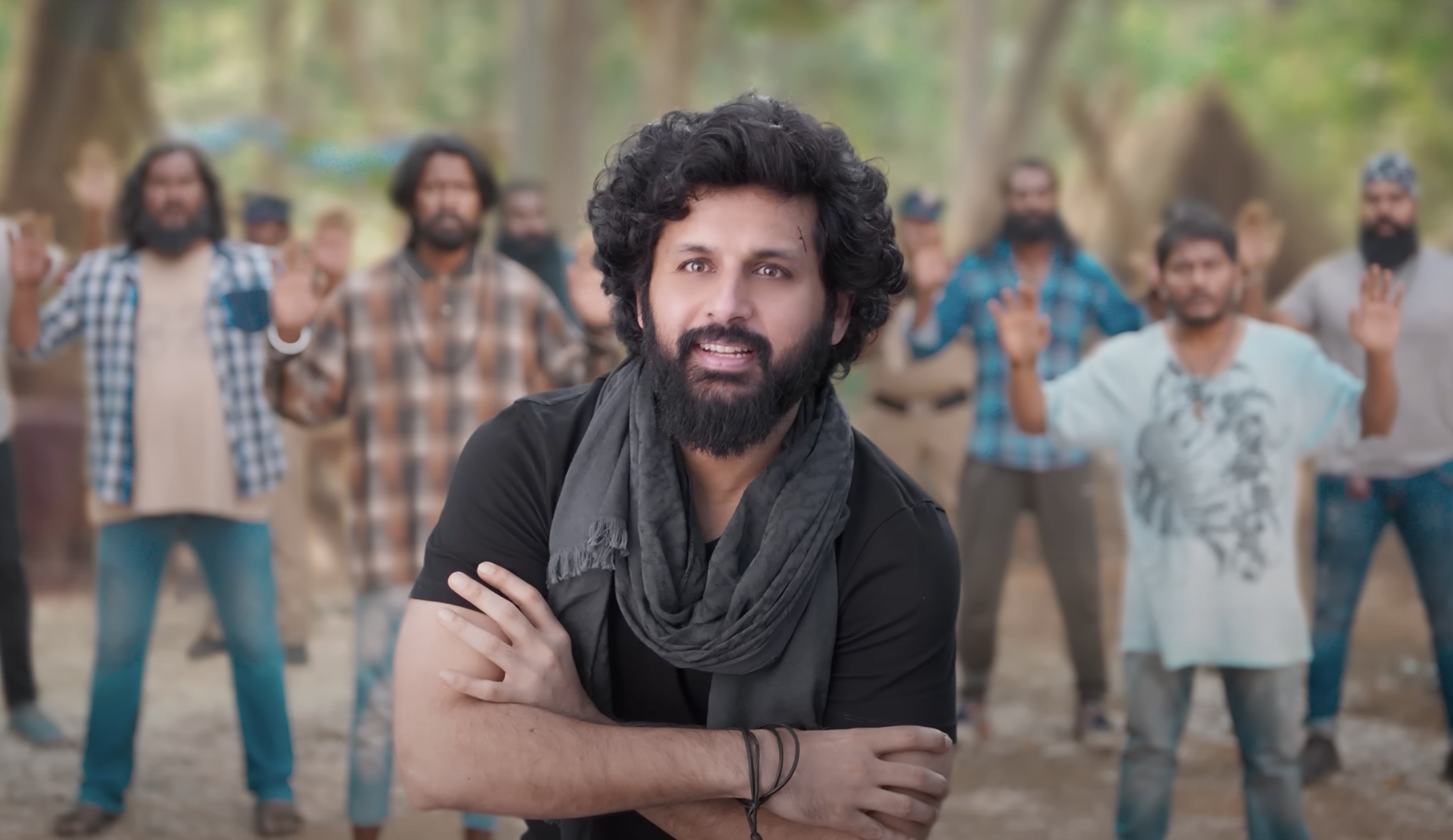
There have been a good number of aggressively, almost mind-bogglingly silly Telugu comedies this year, with Kushi and Rules Ranjann serving as prime examples. Many critics and regular moviegoers alike have commented that Extra Ordinary Man is perhaps the most relentlessly stupid and outdated of them all, and I have no real rebuttal. At times, even applying the loosest standards for comedy, the movie is so ridiculous that it’s downright hard to believe somebody actually financed it and gave it a worldwide release. But something about the film’s manic energy and notable lack of a hard pivot to phony pathos in the third act – which was Kushi’s big undoing – endeared me to it in a major way. Imagine if Ace Ventura and Bowfinger had a Telugu-speaking baby, and you can begin to understand the complete madness that Extra Ordinary Man is dishing out. Sometimes, one just has to admire the sheer audacity of a film’s existence.
It’s hard to capture the frantic comedic spirit of Extra Ordinary Man in writing, but a straight-ahead plot summary is a good place to start. Abhinav (played by Nithiin) is a background actor who’s always in search of a big-break, leading-man role that’s never coming. But he somehow still stumbles into the prospect of unimaginable wealth when he uses his acting skills to help a more-than-tipsy businesswoman named Likitha (Sreeleela) out of a sticky situation at a drunk driving checkpoint (yes, really). Abhinav’s invaluable (read: clueless) assistance soon leads Likitha to make him both the CEO of her company and her boyfriend (again, yes, really). The only problem is: shortly thereafter, he’s asked to take the hero role in an old filmmaker friend’s new detective-versus-gangster movie, requiring him to bail on his burgeoning corporate career. Tragically, Abhinav accepts the role only to be dumped before shooting begins, leaving him once again both jobless and womanless, with nothing to show for himself. The fun is only just getting started, however, as a drunken and dejected Abhinav wanders into a new village only to realize that his life has literally become that of the film role he was just removed from.
Hindi Movie Review: Kadak Singh has its pleasures, but it’s at best a TV-caliber mystery

Aniruddha Roy Chowdhury’s Kadak Singh plays so much like a paperback mystery, it’s a little hard for me to believe that the film comes from an original screenplay and is not, in fact, based on an obscure airport novel. It has many of the trimmings we’ve come to expect of knockoff Agatha Christie: a fortuitous case of retrograde amnesia, an apparent suicide attempt that may not have actually been a suicide attempt, a highly unlikely chance encounter between two parties that is extremely compromising for both, a “trust no one” style of storytelling, and so on and so forth.
As Kenneth Branagh has realized with greater acuity in each successive Christie adaptation he has made, most notably this year’s A Haunting in Connecticut, such hokum can make for a fun cinematic ride as long as it isn’t taken especially seriously. Chowdhury and the filmmaking team behind Kadak Singh didn’t necessarily get that memo, as they consistently try to sell the viewer on the credibility of each preposterous plot point. I don’t know about the average mystery B-movie viewer, but I’m personally more likely to cut the filmmakers slack in terms of plot holes when they dispense of them with a friendly wink.
Hindi Movie Review: The Archies is only ever “good enough” as an international adaptation
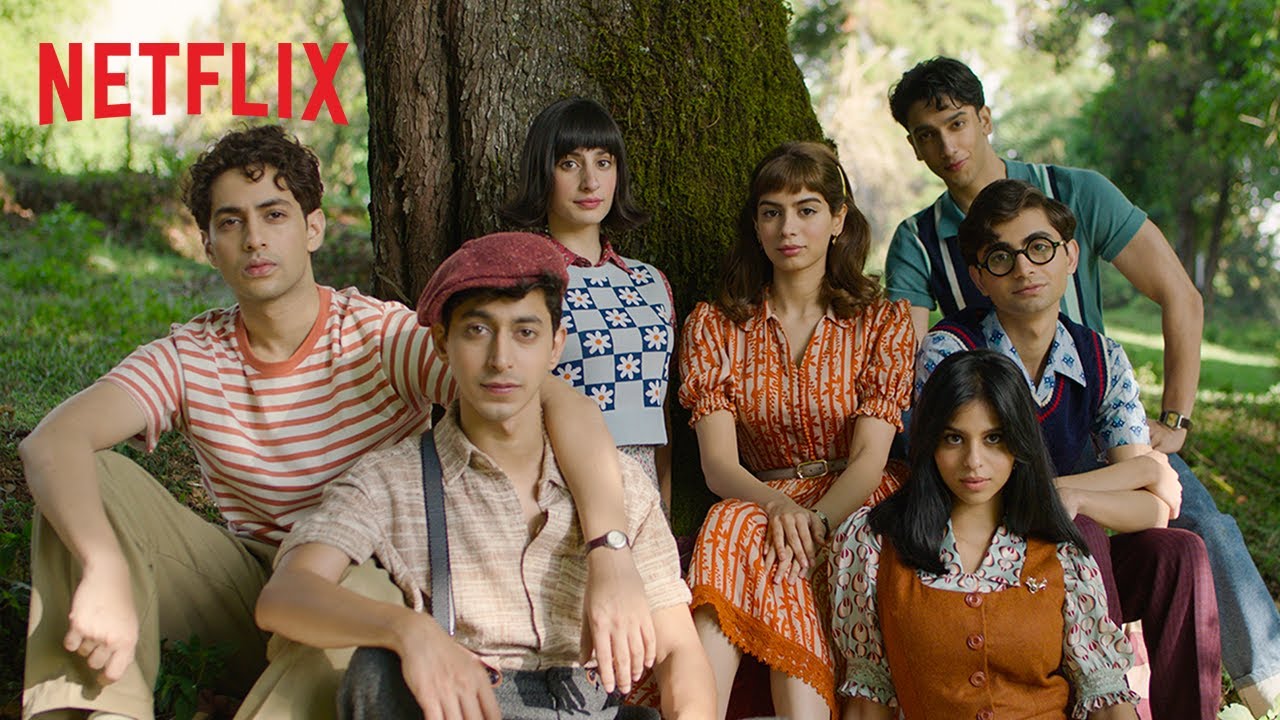
A part of me wants to approach The Archies with extreme cynicism. While the development of a Bollywood adaptation of Archie Comics apparently predated Netflix’s involvement in the project, it’s clear that the only reason this film has been born into the world, looking and feeling like it does, is the international success of Riverdale on the streaming platform. In other words, its very existence was the result of a commercial opportunity rather than an artistic imperative.
The product onscreen reflects this sense of opportunistic, rather than necessary, filmmaking. While Zoya Akhtar’s direction is handsome enough, it bears the distinct look and feel of a Netflix Original, with a fairly muted color palette and compositions tailormade for the TV and not the big screen. It barely feels like a “Bollywood” movie, either, beyond the fact that the characters (mostly) speak Hindi – and this isn’t even the default setting for consumers streaming outside of India, who will have to toggle to the film’s native tongue. This is to say, The Archies feels like a sleek, global two-and-a-half hours of “content” – it could have just as easily been cut into a miniseries as it was a movie – that happens to have been shot in Northern India.
The less cynical part of me would prefer to focus on the fact that The Archies is a mostly charming, easy-to-watch, family-friendly confection with several standouts in the young ensemble cast. It pays a good amount of deference to its American source material to satisfy those viewers with a vested interest in seeing the latest iteration of Archie, but it also doesn’t require any working familiarity with Archie Comics, Riverdale, or any of the other adaptations to be enjoyed. While there’s not a lot about the movie that’s genuinely invigorating or exciting, it’s also a perfectly pleasant piece of Saturday afternoon home viewing.
Hindi Movie Review: Animal may end up being a mess, but it’s often a rousing one, with a truly wild lead performance

Clocking in at three hours and 22 minutes, Sandeep Reddy Vanga’s Animal is the kind of sprawling opus that wins a baseline level of audience admiration through scope of ambition alone. Even as its soap opera-esque dramatics occasionally make it feel more like a television miniseries strung together for theatrical consumption than a bona fide movie, there’s something undeniably bold about the sheer amount of plot that writer/director Vanga squeezes in here.
Even if the material isn’t exactly the most cinematic at the script level, Vanga’s stylistic influences are clearly the kind of films that occupy the biggest screens: The Godfather, Scarface, Kill Bill, John Wick… not to mention all the Bollywood references I certainly missed as a very recent convert to Indian cinema. The term masala film is typically used to describe Indian movies that blend multiple genres into the same work; Animal doesn’t necessarily qualify in the traditional sense, but it combines so many stylistic reference points, watching it can sometimes feel like you’re being pulverized by an immersion blender to the head.
The movie’s strong sense of swag becomes increasingly apparent as it ramps up to its high-body count action sequences, but even before this point, Vanga indulges in his excessive, decadent sense of aesthetics as he introduces and develops the title character. I don’t know if I’ve ever seen exposition this grandiose – and I mean that as a compliment. It helps that Vanga’s leading man, “Superstar Ranbir Kapoor” (as the opening titles credit him), is incredibly game to play in his director’s depraved, pulpy sandbox. His character’s name is technically Ranvijay Singh, but if there ever was an antihero who earned the moniker “Animal,” he is it.

